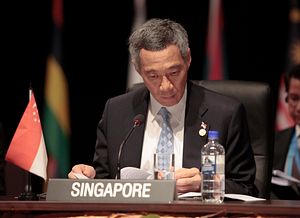On May 6, Singapore and Australia announced that they had reached a key agreement to boost their bilateral relationship.
According to a joint announcement by the two governments, the countries have reached a package deal of measures to begin implementing their comprehensive strategic partnership (CSP) inked last June during the fiftieth anniversary of their diplomatic ties. The deal comes following discussions among high-level officials from both sides, with Singapore’s ministers of foreign affairs, trade and industry and defense all traveling to Australia in March for discussions with their counterparts on the CSP.
The agreement covers a range of initiatives to deepen economic ties, expand defense cooperation and strengthen people-to-people ties. Australian Prime Minister Malcolm Turnbull described the agreement as a “massive upgrading” of the bilateral relationship, while his Singaporean counterpart Lee Hsien Loong called it a “landmark agreement.”
On defense, as I outlined in a separate piece, the two countries agreed to undertake a broad range of measures to boost ties, including elevating a signature joint bilateral military exercise; enhancing personnel exchanges; boosting intelligence and information-sharing; and launching a new Track 1.5 Dialogue. But the item that grabbed the most attention was a multi-billion dollar agreement to jointly develop military training areas and facilities in Australia (See: “What’s Behind the New Singapore-Australia Defense Deal?”).
On economics, while Singapore is already Australia’s fifth largest trading partner and foreign investor, the two sides announced a raft of measures designed to further deepen relations in this area. They include initiatives to update and modernize the 2003 Singapore-Australia Free Trade Agreement; the establishment of an Australian “landing pad” in Singapore to facilitate high-tech Australian start-ups; and support for science and technology collaboration through matching funding provided by both countries.
In terms of people-to-people relations, advances have been made through improved terms of entry for Singaporeans into Australia; strengthened youth exchanges covering students, professionals as well as teachers; and more cooperation and funding directed towards artists, arts groups and cultural institutions.
“This landmark agreement adopted by Singapore and Australia is a major upgrade of the existing strong ties between the governments and people of both countries,” Singapore’s Ministry of Foreign Affairs (MFA) said in a press release on the Singapore-Australia Comprehensive Partnership Package.
“It will transform our long-standing friendship into a dynamic, innovative and truly strategic partnership.”
While praising the agreement as one that would “cement” relations between the two governments and people of both countries, Lee admitted that some of the measures “will take time to bear fruit” even if both sides moved quickly to implement them. Lee had signed the initial CSP with Turnbull’s predecessor Tony Abbott last year.































